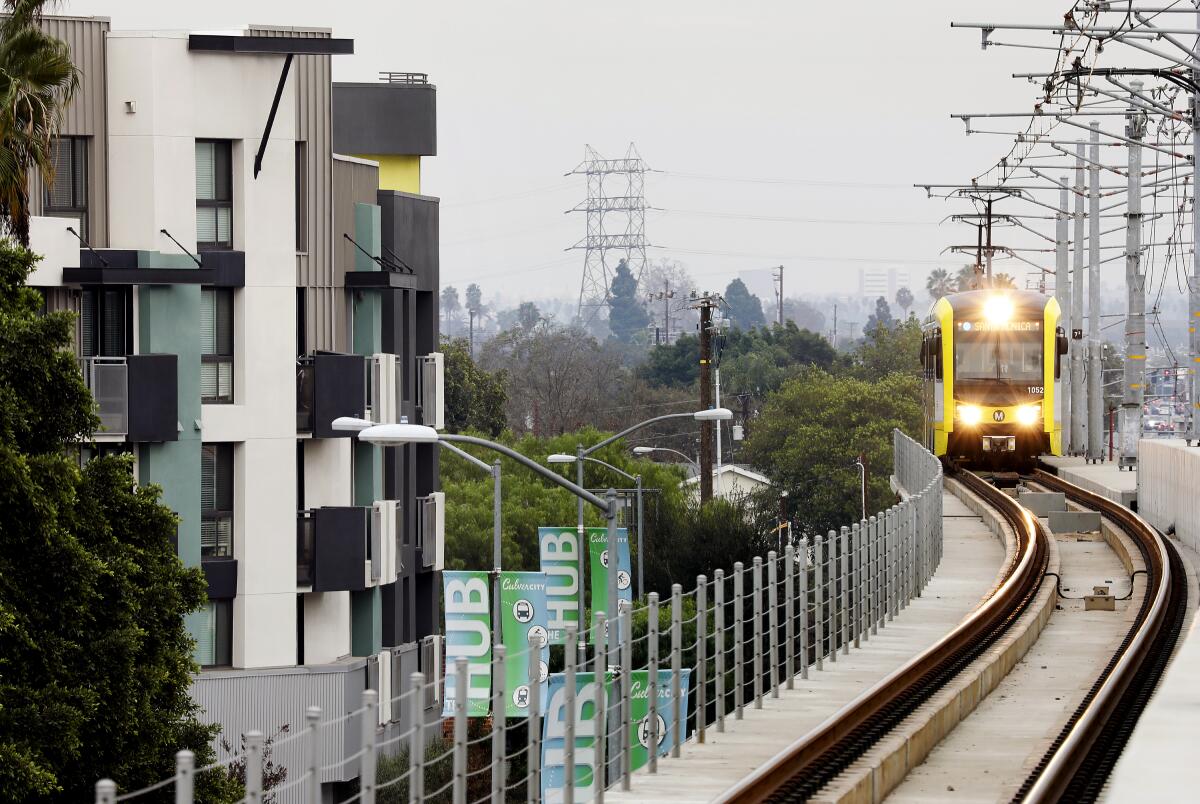Editorial: California should prioritize housing people, not cars

California treats parking like a birthright. But that obsession with ensuring motorists can always find a parking spot sabotages more important goals, including building more housing and reducing driving.
If state leaders are serious about making California affordable, livable and sustainable, they’ve got to stop local laws that prioritize parking over people. One way to do that is eliminating parking requirements in new developments near transit, and there are two bills pending in the Legislature that would do just that.
Most cities require new residential and commercial developments to be built with lots of on-site parking, no matter if the spots are needed or desired. Typically, cities mandate one to two parking spaces per unit in a residential development. It can cost $55,000 per parking spot in a midsize apartment project in Los Angeles, according to one analysis. That drives up the cost of construction and makes it difficult for smaller or less pricey projects to pencil out. The expense of building parking is passed along to tenants and buyers, whether they want the spots or not.
Want cheaper housing and more walkable communities? Make parking optional in new developments
In Los Angeles County, there are more than 19 million parking spaces, almost two per resident, including children, according to a 2015 analysis. The county has dedicated more space to the storage of cars than it has lane miles of streets and roads.
Is all that parking really necessary? Oftentimes, no. A 2019 review of parking requirements examined 10 developments in Southern California built with just the minimum number of spots required by local laws and found that peak parking utilization was 56% to 72% at each development. Localities were demanding more parking than needed.
Eliminating parking requirements doesn’t mean parking will disappear from new development. Builders could still choose to provide parking — and many probably would — but the number of spaces would be determined by location and market demand, not by a blanket requirement.
Assembly Bill 2097 by Assemblymember Laura Friedman (D-Glendale) would eliminate parking requirements for commercial projects and residential developments with 40 or fewer units that were within a half mile of a major transit stop. Larger residential projects could also be exempt if they included affordable units. (All projects would still have to follow state laws that require electric vehicle charging and disabled accessible parking.)
Newsom’s one-time budget-surplus funding plan for climate change is a good thing. But it’s no substitute for real climate action by state lawmakers.
It’s an important bill, and Friedman carried a similar version last year but it was blocked without debate by the Senate Appropriations Committee chair, Sen. Anthony Portantino (D-La Cañada Flintridge), drawing fury from housing and transportation advocates who backed the bill.
Portantino said he took their complaints to heart and came back this year with his own bill on parking minimums. Senate Bill 1067 would prohibit cities from imposing parking requirements on housing developments within a half-mile of a major transit stop if the project includes 20% affordable housing or the developer can show the project wouldn’t negatively affect parking in the area or achieving the localities’ affordable housing development targets.
This bill gives cities more discretion to maintain parking requirements than Friedman’s approach. Discretion can be helpful in some cases, but it can also be destructive when it’s used to block higher-density multifamily housing simply because residents don’t like it, something that has happened far too often in California.
But Portantino’s bill wouldn’t apply to commercial developments. There’s a good argument that excessive parking requirements hurt small businesses trying to find affordable space. And it conflicts with the state’s climate goals to reduce greenhouse gas emissions from transportation. The requirement to build so many parking spots is based on the idea that everyone will drive everywhere all the time. California is trying to change that dynamic by investing in public transit and building more walkable and bikable communities.
While housing should be the state’s highest priority right now, lawmakers need to look more broadly at the way local parking requirements undermine their goals of revitalizing commercial corridors and building sustainable communities.
Friedman and Portantino have put forward good bills to fix a long overlooked problem in urban planning and, ideally, the two will combine the best of both bills into one package that lawmakers and Gov. Gavin Newsom can support. Local parking requirements are standing in the way of progress on key state housing and climate priorities, and lawmakers have an obligation to intervene. Eliminating parking minimums can help shift California’s mindset toward a future that prioritizes people over cars.
More to Read
A cure for the common opinion
Get thought-provoking perspectives with our weekly newsletter.
You may occasionally receive promotional content from the Los Angeles Times.











